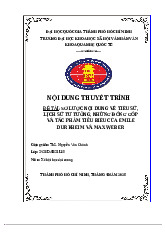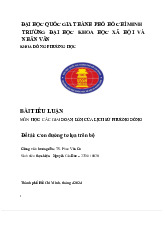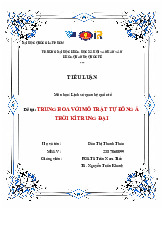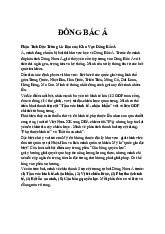




Preview text:
lOMoARcPSD|35919223 Unit 7: WORK Lead-in:
A: Hey! You look so confused. What's wrong with you?
B: Oh, hi. I need some money to buy some books now. So I want to apply for a part-time
job., Have you ever worked a part-time job while studying?
A: Yes, I have. It was a great way to earn some extra money and gain some work experience.
B: That’s interesting. What are some of the bene昀椀ts of working part-time while studying?
A: Well, for one, it can help you develop valuable skills that will be useful in your
future career. You can learn how to manage your time effectively, communicate with
others, and work as part of a team. Additionally, it can help you build your resume
and make you more competitive in the job market.
B: That makes sense. Are there any drawbacks to working part-time while studying?
A: Yes, there can be. For example, it can be challenging to balance your work and
study commitments, and you may 昀椀nd that you have less time for other activities.
Additionally, working too many hours can lead to burnout and negatively impact your academic performance.
B: I see. What skills do you think students should develop to succeed in the workplace?
A: There are many skills that are important for success in the workplace. Some of
the most important ones include communication, time management, problem-
solving, and teamwork. Additionally, it’s important to be adaptable and willing to learn new things.
B: That’s helpful. How can students develop these skills?
A: There are many ways to develop these skills. One way is to take on a part-time job
or internship while studying. This can give you the opportunity to practice these skills
in a real-world setting. Additionally, you can participate in extracurricular activities or
volunteer work to develop these skills.
B: That’s great advice. Thanks for sharing your insights with me.
A: You’re welcome. Good luck with your studies and future career! UNIT 8: TECHNOLOGY
Friend 1: Hi, What are you watching?
Friend 2: I’m watching a video about Sophia. She is the 昀椀rst robot to be accepted as a citizen in the world.
Friend 1: Wow, how intelligent . So, what do you think about technology?
Friend 2: Well, I think technology has brought a lot of bene昀椀ts to our lives. For
example, it has made communication much easier and more convenient. We can
Downloaded by V?n Lê Ti?n (vanlehcp1152001@gmail.com) lOMoARcPSD|35919223
now easily connect with people from all over the world through social media, video calls, and messaging apps.
Friend 1: That’s true. What other bene昀椀ts do you think technology has brought?
Friend 2: Technology has also made it easier for us to access information. We can
now 昀椀nd answers to almost any question we have just by doing a quick search on
the internet. It has also made many tasks much easier and more e昀케cient, such as
online shopping, banking, and booking travel.
Friend 1: Those are some great points. But what about the harms of technology? Do you think there are any?
Friend 2: Yes, I do. One of the biggest harms of technology is that it can be
addictive. Many people spend hours each day on their phones or computers, which
can lead to problems such as eye strain, headaches, and sleep disorders. It can
also be a distraction from other important activities, such as spending time with family and friends.
Friend 1: That’s de昀椀nitely a concern. What other harms do you think technology can cause?
Friend 2: Another harm of technology is that it can be used to spread
misinformation and fake news. With so much information available online, it can be
di昀케cult to know what is true and what is not. This can lead to confusion and even
con昀氀ict between people who have different beliefs.
Friend 1: I see what you mean. So, what do you think we can do to minimize the
harms of technology while still enjoying its bene昀椀ts?
Friend 2: I think it’s important to use technology in moderation and to be aware of
its potential harms. We should also be careful about the information we consume
online and make sure to fact-check anything that seems suspicious. And most
importantly, we should make sure to spend time o昀툀ine and connect with the people and world around us.
Friend 1: Those are some great tips. Thanks for sharing your thoughts with me.
Friend 2: No problem, anytime. UNIT9 : HOLIDAY
Friend 1: Hi, how are you doing?
Friend 2: I’m doing well, thanks. How about you?
Friend 1: I’m good too. So, have you made any plans for the upcoming holiday season?
Friend 2: Not yet, but I was thinking of going on a trip somewhere. Do you have any suggestions?
Friend 1: Well, the 昀椀rst step in planning a holiday is to decide on a rough idea of what you want to
do and where you want to go. Do you want to go somewhere warm or cold? Do you want to relax
on a beach or go on an adventure?
Downloaded by V?n Lê Ti?n (vanlehcp1152001@gmail.com) lOMoARcPSD|35919223
Friend 2: Hmm, I haven’t really thought about that. I guess I would like to go somewhere warm and relaxing.
Friend 1: Okay, that’s a good start. The next step is to decide who you want to go with and when
you want to go. Do you want to go alone or with friends or family? And when do you have time off work or school?
Friend 2: I think I would like to go with my family, and we have about a week off during the holiday season.
Friend 1: Great. Now that you have a rough idea of what you want to do and when you want to go,
you can start looking for destinations that 昀椀t your criteria. You can use travel websites or apps to
search for 昀氀ights, hotels, and activities.
Friend 2: That sounds like a good idea. Do you have any recommendations for travel websites or apps?
Friend 1: Sure, some popular ones are Expedia, Kayak, and TripAdvisor. They allow you to
compare prices and read reviews from other travelers.
Friend 2: Okay, I’ll check those out. Thanks for the advice.
Friend 1: No problem. Just remember to book early to get the best deals, and make sure to pack
everything you need for your trip.
Friend 2: Will do. Thanks again for your help.
Friend 1: Anytime. Have a great trip! UNIT 11: HISTORY
Friend 1: Hi, how are you doing?
Friend 2: I’m doing well, thanks. How about you?
Friend 1: I’m good too. So, have you ever visited any famous towns from the past?
Friend 2: Yes, I have. I visited Pompeii in Italy last year. It was amazing to see the
ruins of an ancient Roman city.
Friend 1: That sounds fascinating. What kind of artifacts did you see there?
Friend 2: Well, there were many artifacts on display in the museum, such as pottery,
jewelry, and sculptures. But the most impressive artifacts were the plaster casts of
the victims of the volcanic eruption that destroyed the city.
Friend 1: Wow, that must have been quite an experience. What other famous towns
do you know of that have interesting artifacts?
Friend 2: There are many, but one that comes to mind is Machu Picchu in Peru. It’s
an ancient Incan city that was rediscovered in the early 20th century. There are many
artifacts on display there, such as pottery, textiles, and tools.
Friend 1: That sounds fascinating. What other towns can you think of?
Friend 2: Another famous town is Petra in Jordan. It’s an ancient city that was carved
into the rock by the Nabataeans over 2000 years ago. There are many artifacts on
display there, such as pottery, jewelry, and coins.
Downloaded by V?n Lê Ti?n (vanlehcp1152001@gmail.com) lOMoARcPSD|35919223
Friend 1: Those all sound like amazing places to visit. What do you think makes these towns so interesting?
Friend 2: I think it’s the combination of the ancient history and the artifacts that have
been preserved over time. It’s amazing to see how people lived in the past and to
learn about their culture and traditions.
Friend 1: I agree. It’s important to preserve these artifacts so that future generations can learn from them.
Friend 2: De昀椀nitely. And it’s also important to make sure that these artifacts are
displayed in a way that is respectful to the people who created them.
Friend 1: Absolutely. Well, thanks for sharing your thoughts with me. I’ll have to add
these towns to my list of places to visit.
Friend 2: No problem, anytime. I hope you get a chance to visit them soon. UNIT 12:NATURE
Friend 1: Hi, how are you doing?
Friend 2: I’m doing well, thanks. How about you?
Friend 1: I’m good too. So, have you ever been on a nature vacation?
Friend 2: Yes, I have. I went on a camping trip in Yosemite National Park last year. It
was amazing to be surrounded by such beautiful scenery and to be able to
disconnect from the hustle and bustle of everyday life.
Friend 1: That sounds wonderful. What other nature vacations can you recommend?
Friend 2: Well, there are many great options depending on what you’re interested in.
If you like hiking, I would recommend visiting Banff National Park in Canada. It has
some of the most beautiful hiking trails in the world, with stunning views of the Rocky Mountains.
Friend 1: That sounds amazing. What other destinations can you think of?
Friend 2: Another great option is Costa Rica. It’s known for its incredible biodiversity
and has many national parks and nature reserves to explore. You can go on guided
tours to see exotic animals such as monkeys, sloths, and toucans.
Friend 1: Wow, that sounds like a lot of fun. What other nature vacations can you recommend?
Friend 2: If you’re interested in marine life, I would recommend visiting the Great
Barrier Reef in Australia. It’s the largest coral reef system in the world and is home to
thousands of species of 昀椀sh, turtles, and other marine animals.
Friend 1: That sounds incredible. What other destinations can you think of?
Friend 2: Another great option is Iceland. It’s known for its stunning natural beauty,
with geysers, waterfalls, and hot springs to explore. You can also go on guided tours to see the Northern Lights.
Downloaded by V?n Lê Ti?n (vanlehcp1152001@gmail.com) lOMoARcPSD|35919223
Friend 1: Those all sound like amazing places to visit. What do you think makes nature vacations so special?
Friend 2: I think it’s the opportunity to disconnect from technology and to be
surrounded by the beauty of nature. It’s a chance to slow down and appreciate the world around us.
Friend 1: I agree. Well, thanks for sharing your thoughts with me. I’ll have to add
these destinations to my list of places to visit.
Friend 2: No problem, anytime. I hope you get a chance to visit them soon.
Downloaded by V?n Lê Ti?n (vanlehcp1152001@gmail.com)




